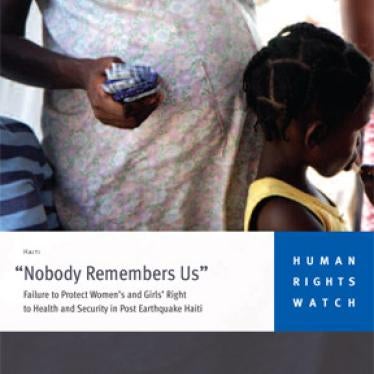Myriam Merlet, Magalie Marcelin and Anne Marie Coriolan were three of Haiti’s most forceful advocates for women’s rights. They established some of the few groups that helped Haitian women recover from domestic violence and rape, pursue justice and restart their lives. All three perished in the quake on January 12, 2010.
Haiti’s weak laws on violence against women often stymied their efforts. They joined forces with other activists in calling for legal reform to fix the many gaps in law and services. For the last two years, it has seemed that their hope of transforming Haiti’s laws to improve services for victims of domestic violence and rape remained buried in the rubble.
But an effort is under way to resurrect their dream. Haiti’s Ministry of Women’s Affairs will soon introduce comprehensive legislation to prevent and eliminate violence against women and girls in Haiti. This week, [Monday] members of the US Congress backed this effort by introducing a resolution to support the bill. Representatives from both parties should vote to adopt this resolution.
Haiti desperately needs legal reform on gender-based violence. Haitian law prohibits domestic violence against minors but does not classify domestic violence against adults as a distinct crime. The penal code includes penalties for rape but does not address marital rape. Women and girls cannot seek protection orders from judicial officers.
Beyond gaps and discrimination in Haiti’s laws, survivors of rape and domestic violence also struggle to get basic services, and the government, with its few resources, has done little to make them available. Haiti has just a handful of shelters for domestic violence victims throughout the country, none of which receive government funding. Public health agencies and justice institutions have not been able to agree on a form for documenting forensic evidence or rape, often leaving survivors unable to pursue justice in court even if they make it to a doctor.
The problems that rape and domestic abuse victims face in accessing justice and services were magnified by the earthquake. Although comprehensive, current, nationwide data on gender-based violence in Haiti are not available, some studies have shown huge jumps in reported rapes in certain locations. The camps for people displaced by the earthquake, where I spent months in 2010 and 2011 documenting sexual violence and inaccessibility of justice and services, are the site of many attacks. Yet many still have inadequate lighting, toilet facilities and security.
Sixteen-year-old Florence was one of the 128 women and girls I interviewed in Haiti. She was an orphan working for a family in Port-au-Prince when the earthquake hit. Her employer’s home was destroyed, and she moved with the family into a tent in a displacement camp. There, her employer raped her. She was too terrified to report the rape immediately, and had no idea where to turn for medical or other services. A few months later she tried to press charges, but was told her case had no chance of success without a medical certificate with forensic evidence of the rape.
The bill that will soon be introduced in parliament by the Women’s Ministry in Haiti would help girls and women like Florence. It would not only establish new legal standards but also put in place the institutional framework to help women and girls recover from violence and rebuild their lives. It would also require the government to invest in public information campaigns so that victims like Florence would know where to turn.
The House resolution on violence against women in Haiti is sure to raise the pressure among lawmakers in Haiti to act on the proposed law reforms. It calls on not just the Haitian government but also the US government to make the issue of violence against women and children a priority in reconstruction efforts. It emphasizes the need for victims of violence to have access to comprehensive, affordable, adequate and appropriate medical care. Most important, the resolution is a show of solidarity with one of the US’s closest neighbors as it boldly takes on a difficult task.
Members of Congress on both sides of the aisle should put their full support behind the reforms needed to address gender-based violence in Haiti. In honor of women’s rights visionaries like Myriam Merlet, Magalie Marcelin and Anne Marie Coriolan, and of the women and girls like Florence who seek justice and dignity as survivors of abuse, they should vote in favor of the resolution.







